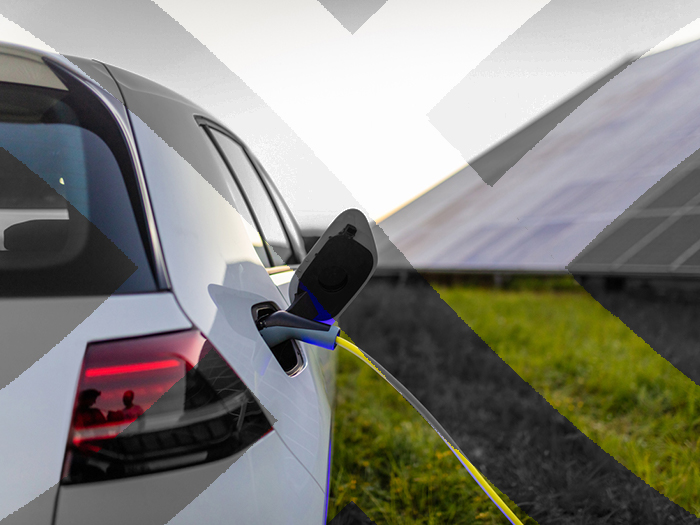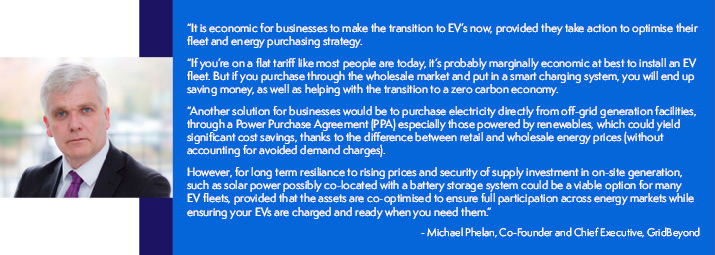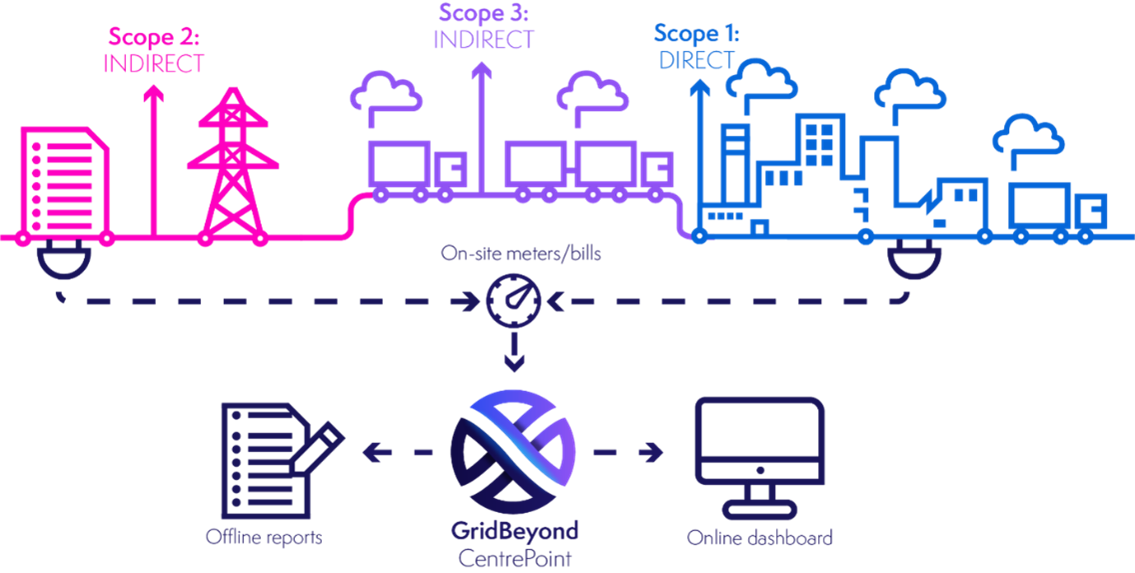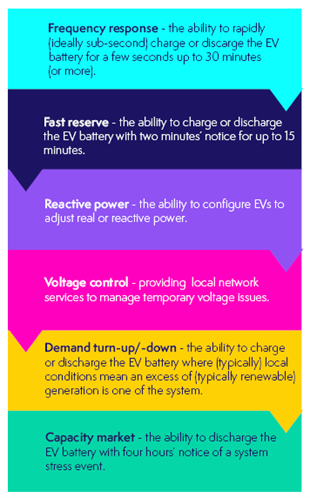Insights
better business decisions
Posted 3 years ago | 7 minute read

How EVs are disrupting fleet management
Transport permeates almost every business sector in one way of another and for any business, an efficient transport component is not just a way to optimise costs but is often a matter of survival. But the transport industry is changing as electric vehicles (EVs) move from consumer vehicles to the commercial sphere at an increasing pace.
Falling costs, widening availability, and support from policy-makers, have spurred a recent rise in sales of electric vehicles (EVs). But as EVs become more common, electricity demand will inevitably rise. This will create new opportunities for commercial EV fleets. Ultimately, it could help turn what is currently a cost centre – refuelling – into a potential revenue stream through optimisation of electricity use.
Supporting policies
As of 2019, transport was the largest-emitting sector of the UK economy at 122MtCO2e, accounting for 27% of total UK greenhouse gas (GHG) emissions. The importance of EVs was outlined in updated advice on meeting the net zero 2050 target, published in May 2019 by the Committee on Climate Change (CCC) – the statutory advisors on emissions reductions for Government. This said that the market for electric cars and vans should scale up to 100% of new sales by 2035 at the latest (and ideally by 2030) to meet the net zero target. On 14 July 2021, the UK government published its transport decarbonisation plan, Decarbonising transport: a Greener, Better Britain, a delivery plan for the transition to zero emission cars and vans by 2035 and a Green Paper on a New Road Vehicle CO2 Emissions Regulatory Framework for the UK.
In the US, the 2008 Energy Improvement and Extension Act granted tax credits for new qualified plug-in electric vehicles, and the majority of states have established incentives and tax or fee exemptions for EVs. The US has also announced plans to invest $7.5B in clean school buses and ferries and a further $7.5B to build a national network of electric vehicle charging infrastructure.
The majority of vehicle manufacturers have also unveiled or announced plans to manufacture electric versions of their commercial vehicles and EV infrastructure solutions and the latest statistics from the Society of Motor Manufacturers and Traders (SMMT) have shown that in the light commercial vehicle (LCV) sector battery-powered EV uptake soared by 142.3%, reaching a total market share of 3.6%.
The growing popularity of EVs will modify the approach to fleet management. Here we take a look at the drivers behind this change, impacts on the wider energy sector and some considerations for businesses looking to upgrade their fleets to electric.
Charging becomes an operational process
With fuelled vehicles, the refuelling process is quick and simple, but charging a modern electric car takes much longer. This means its critical to plan the workload of EVs and their charging schedule. To ensure the fleet’s full functioning, it’s necessary to constantly collect and analyse data on the battery charge status of the entire EVs fleet to make the optimal charging schedule.
In addition, organisations with large EV fleets are going to look how to charge them at the most optimal time. That will be when the price of electricity is at its lowest, which is typically overnight. But if millions of EVs are charging at the same time, electricity will become more expensive so it’s important to understand the dynamics of energy markets and have a forecasting solution to keep your costs as low as possible.
It is also important to ensure your grid connection can provide the necessary capacity at your location. If the network operator needs to upgrade the power connection, they can demand a surcharge from companies. In addition, contracts must allow, or be upgraded to allow, the required connection capacity, which in turn has associated costs.

New monitoring parameters required
EVs can dramatically change fleet management in the coming years. In comparison to vehicles with an internal combustion engine (ICE), EVs have many parameters that need to be monitored for more accurate control of the fleet. Collecting and analysing data generated by vehicles will be extremely important for businesses to manage their fleets effectively.
- Charge status: EV fleet owners should monitor levels of charge to plan the order of charging vehicles.
- Battery health: As batteries degrade over time, monitoring the battery condition will allow you to understand the maximum possible mileage and plan for replacement without long downtimes. The battery is the most expensive element to maintain and the price for its replacement can be costly. When choosing vehicles for your fleet, it’s worth paying attention not only to the cost and brand, but also about the battery replacement policy, its cost, delivery and replacement time as well as disposal.
- Mileage: This parameter is monitored in cars with ICEs, but it’s more important for EVs. It not only shows the energy consumption per kilometre or how efficiently the car is used but also helps understand how external factors affect the vehicle — for example, how much the driving range decreases in cold weather.
- Energy recovery: It’s crucial to understand how much energy an EV receives while driving. Monitoring this parameter and further data analysis can help manage the fleet more efficiently, plan the charging schedule and make other data-based decisions.
- Maintenance: EVs have fewer moving units, which means that there should be fewer various breakdowns. Idle hours of EVs should be much shorter, and their maintenance should be cheaper. But this doesn’t mean that EVs have no drawbacks.
- Carbon and sustainability impacts: Although no greenhouse gas emissions directly come from EVs, they run on electricity that is, in large part, still produced from fossil fuels. When it comes to measuring and reporting on emissions and sustainability the emissions from your fleet will be measured under scope 2 (electricity use) rather than scope 1 (direct consumption), so it is crucial that this is accounted for to ensure accurate reporting.

Optimising your fleet
EV adoption is an important part of the transition to a low-carbon energy future, but rapid EV uptake will create challenges for the grid. However, the EV itself could provide part of the solution. The shift to EVs bring numerous benefits and opportunities for businesses to optimise energy strategies while supporting the integration of renewable energy into the grid.
In addition to being a more sustainable option at a time when employees and supply chains are demanding action on the environment, EV fleets can provide cost reductions over the lifetime of their ownership. With lower overall running costs, an increasing number of tax benefits, and grants, the savings compared to traditional vehicles soon add up. But in addition to these benefits there are revenues to be made through providing services to the grid. The specific characteristics of EVs mean that they have potential to provide balancing and demand response services.

Choosing an IoT platform
Transitioning your fleet introduces a new set of challenges that go well beyond the vehicles. To fully capture the opportunities in the EV fleet-charging market your business needs access to price signals from the energy market to enable real-time decision-making and an intelligent management system to optimise charging in alignment with demand, power prices, traffic conditions, and charging-station availability.
When choosing an IoT platform, look for something that’s versatile and hardware-agnostic. If you plan to use hardware from different manufacturers or your fleet consists of cars of different brands, choose an IoT platform independent of the hardware manufacturer. This can give you more freedom in selecting sensors based on your objectives, preferences and budget.
GridBeyond is helping businesses across the UK, US and Ireland make the switch to EVs. Our end-to-end service gives businesses a clear roadmap to cleaner fleets and lower emissions. If you are considering the switch to EVs, find out how we can help you on your journey.

Revving up the Grid | Opportunities for EV Fleet Owners
Transitioning your fleet to battery-electric technology introduces a new set of challenges that go well beyond the vehicles.
Learn more





